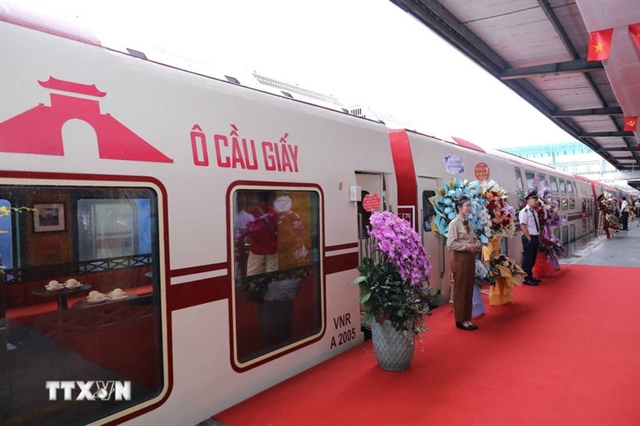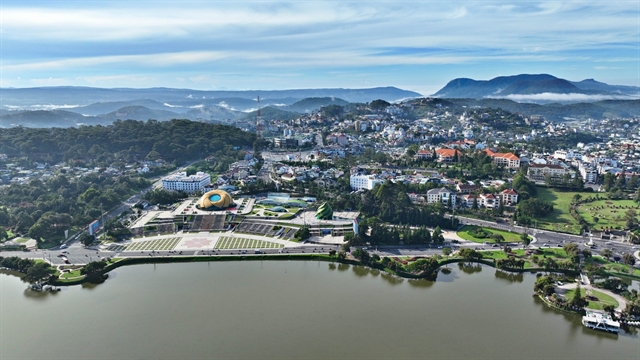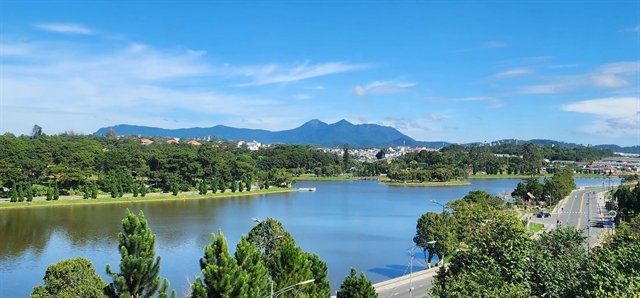 Life & Style
Life & Style


|
| Đà Lạt city plans to attract more tourists with its focus on green tourism. Photo bvhttdl.gov.vn |
LÂM ĐỒNG Đà Lạt is focusing on green tourism and leveraging cultural industries rooted in the natural landscape, biodiversity, and the rich local culture to attract more international visitors.
Despite consistently ranking among the most sought-after destinations for domestic travellers, the resort city Đà Lạt in the Central Highlands province of Lâm Đồng has yet to make a significant impression on the international tourism map.
The city plans to attract more tourists, especially foreign visitors, with green and sustainable tourism.
In early this month, the streets of Đà Lạt, especially in the heart of downtown like Xuân Hương Lake, Lâm Viên Square, and Đà Lạt Market, are bustling with visitors from across the globe.
Among them are tour groups from South Korea, China, Indonesia, and India, travelling for leisure or combining tourism with business events.
Dung Nguyễn, a representative of Đà Lạt Wonderland, said that the resort has maintained a 70 per cent occupancy rate during the week days and has been fully booked on weekends since early December.
“The shift in foreign visitor trends after the pandemic reflects the success of promotional efforts by the local tourism sector,” Dung said.
For nature enthusiasts, The Florest - Hoa Trong Rừng (Flowers in the Forest), Đà Lạt’s largest flower garden located 20 kilometres from the city centre, is a must-visit.
Chosen as the venue for introducing international experts and tourists on December 17, The Florest amazed visitors with its vibrant flower fields surrounded by expansive forests and mountains.
A group of specialists from Suphan Buri, Thailand, expressed their admiration for the picturesque flower hills.
Apinya, a member of the group, said that the weather, food, and scenery had delighted everyone at the party.
Nguyễn Thị Hảo, manager of The Florest, highlighted the garden’s advantages for sustainable tourism development.
Spanning 60 hectares, with 25 hectares currently in use, the garden features various flowers such as dahlias, hydrangeas and roses. It focuses on ecological conservation and preserving local flora and fauna.
“We follow a clean agriculture model for sustainable growth, aiming for higher standards. Alongside this, we integrate local culture with agritourism to captivate visitors,” Hảo said.

|
| Đà Lạt ranks among the top three domestic destinations favoured by Vietnamese travellers in 2024. Photo thanhnien.vn |
Strategies
According to Outbox Intelligence, Đà Lạt ranked among the top three domestic destinations favoured by Vietnamese travellers in 2024.
Outbox Company Director Phước Đặng said that 89.3 per cent of domestic visitors come to the city to relax, drawn by its mild climate and beautiful natural landscape.
However, a survey by Agoda, released on December 17, revealed that Đà Lạt ranks second among domestic destinations searched by Vietnamese tourists for the Lunar New Year holidays.
Despite this, it remains absent from the list of international travellers’ choices for New Year’s Eve celebrations.
Jackie Ong, PhD, a senior lecturer in tourism and hospitality management at RMIT University Việt Nam, said that Đà Lạt has only recently gained recognition in the global tourism community.
This highlights its untapped potential for attracting foreign visitors.
“My niece recently had a short holiday in Việt Nam and chose to spend 24 hours in Đà Lạt,” Ong said.
“Even though I offered suggestions, she explored the city on her own, likely guided by online information. For many visitors, Đà Lạt remains a city of flowers and romance. However, younger tourists see it as a city with cool weather, unique spaces, trendy cafés, and delicious food. The chilly weather is a distinctive feature that sets Đà Lạt apart from other hot-climate destinations,” he said.
Tạ Thị Tú Uyên, a representative of Vietravel, said that Đà Lạt’s tourism offerings are primarily designed for domestic tourists.
In contrast, international travellers seek deeper, exploratory experiences that reflect cultural identity.
“They travel less frequently, move slowly, but demand in-depth experiences. To attract international visitors, Đà Lạt needs tailored products and enhanced publicity and promotion strategies,” Uyên suggested.
To capitalise on global markets, Đà Lạt should invest significantly in tourism infrastructure, particularly in upgrading Liên Khương Airport into an international transport hub.
Developing high-end and unique tourism products, such as agricultural exploration tours and world-class events, could be transformative in drawing international crowds.
Collaborating with digital platforms to promote Đà Lạt’s image to global audiences is also essential.
Uyên emphasised that while Đà Lạt is being positioned as a creative city, its reputation as the “City of Flowers” should not be overlooked. This can elevate cultural value and align tourism with agriculture.
“International visitors often seek authentic local qualities and natural beauty in the places they visit. It’s essential to preserve the unique ‘essence of Đà Lạt’,” Uyên said. VNS